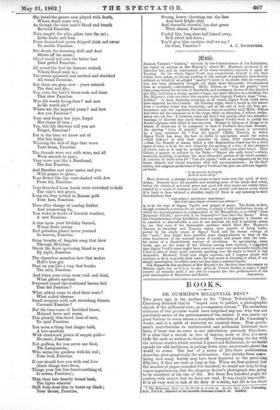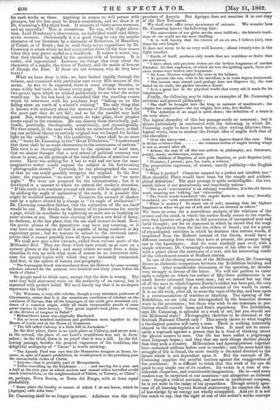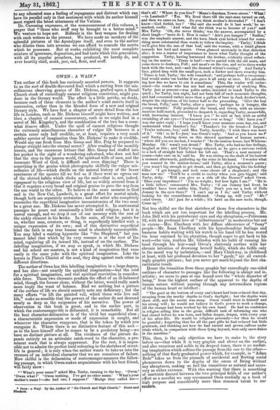BOOKS.
DR. CUMMING'S MILLENNIAL REST.*
• The Millennial Rat; or, the World as it will be. By the Rev. John commix*, D.D., F.R.S.E., Minister of the Scottish National Church, fix. Bentley.
Two years ago, in the preface to his "Great Tribulation," Dr. Cumming declared that he " hoped soon to publish a photographic sketch of the millennial state, as a companion volume." The audacious calmness of this promise would have surprised any one who was not previously aware of the performances of the author. It was lately our good fortune to come across a complete collection of Dr. Cumining's works, and in a spirit of curiosity we counted them. That gentle- man's contributions to controversial and millennial literature have been, if there was no error in our calculation, precisely fifty-three. It is clear that a sketch or two of heaven, more or less, is a mere trifle for such an author to throw off. Occupied during the day with the serious studies which combat Liguori and Bellarmine, he no doubt spends his odd half-hours in jotting down stray memoranda about the world to come. The last of a series of fifty-three publications describes photographically the millennium. One shrinks from spacu lating how many worlds may have been depicted in the precediag fifty-two, if they are each as long as this. When we first noticed that the number of pages exceeded five hundred, we could not help feeling vague apprehension that the eloquent doctor's photograph was going to be somehow of the size of life. But these five hundred pages we confess with sorrow that we have not read. It was simply impossible. It is all very well to talk of the duty of a critic, but hfe is too short for such works as theie. • Anything in reason we will peruse with pleasure, but the line must be drawn somewhere, and we draw it at Dr. Cumming's fifty-third book. It consists of thirty-seven sermons, and an appendix ! This is monstrous. To use, with slight altera, tion, Lord Dundreary's observation, no individual could read thirty- seven sermons. Occasionally it is a good thing to vary the secular character of our literature by a discourse of Robertson, of Massillon, of Colani, or of South ; but to read thirty-seven expositions by Dr. Cumming is a task which we had much rather defer till the time comes when they may prove useful as a handbook. It makes it worse, too, that they should be called by the specious title of lectures. It is unfair, and hypocritical. Lectures are things that treat about the chemistry of a candle, the rivers of Tartary, and the maids of honour of George the First. If these are not sermons, why do they have texts ?
What we have done is this : we have looked rapidly through the volume, and examined with particular care every fifth sermon of the series. As was to be expected, there is some strange blunder, or some wildly bad taste, in almost every page. But there were one or twopoints upon which we wished particularly to see what the writer would say. In his last book he remarked that the startling events which he interwove with his prophecy .kept "falling on us like falling stars on earth of a winter's evening." The only I hing that is known with certainty about the meteors of November is that for the most part they do not fall ; and so far the parallel may hold good. But, whatever startling events do take place, their prophet seems equal to the occasion. He can discuss them historically, poli- tically, poetically, theologically, scientifically, and etymologically. We were struck, in the same work which we mentioned above, at find- ing one political theory so entirely original that we longed for further light on the subject. " By this prediction, there shall be no more sea,' " wrote Dr. Cumming, in the " Great Tribulation," " I understand that there shall be no more obstruction to the intercourse of nations." This view is so thoroughly contrary to the opinions of most men, that we almost thought that a new school of political economy was about to arise, on the principle of the total abolition of maritime com- merce. There was nothing for it but to wait and see how the same imaginative writer would expand the subject in his forthcoming "photographic sketch." Certainly, lie has photographed the ocean so that no one could possibly recognize the original. In the first place, the expression "no more sea" is equivalent to "no more night." We were not prepared for the interpretation ; but it is developed in a manner to which we entreat the reader's attention. "If this earth is to continue a round orb there will be night and day ; by shifting the angle of inclination of the earth, it is possible that might be modified immensely. . . ." Conceive the amount of shadow cast by a sphere altered by a change in " its angle of inclination ! " Dr. Cumming considers further, that the extinction of the sea itself would be sad. He dwells on the beauty of its phenomena for nearly a page, which lie concludes by explaining no more sea as implyina'c' no more storms at sea. Once more starting off into a new field of fancy, he declares, in the last place, that the sea shall restore its dead. Now, the poetic phrase of the Apocalypse may have any meaning, or it may have no meaning at all that is capable of being rendered in dry expository prose ; but we venture to submit to the reverend inter- preter that it cannot possibly have all these meanings at once.
We shall now give a few extracts, culled from various parts of the Millennial Rest. They are those which have struck us at once on a cursory glance at the book; and many others we omit from a disin- clination to mix up with what must of course be an irreverent criti- cism the special topics with which they are intimately connected. And first, in the sphere of history and geography :
" The Septuagint Greek was translated from the Hebrew by some seventy scholars selected for the purpose two hundred and sixty years before the birth of Christ."
So people used to think once, except that the date is wrong. The next very bold statement rests on the authority of an enemy, but is repeated with perfect belief. We need hardly say that it in no degree represents the truth :
"Dr. Wiseman, a very able scholar, though a very mistaken professor of Christianity, states that it is the unanimous conclusion of scholars on the continent of Europe, that all the languages of the earth give abundant evi- dence of a common origin, while all retain irrepressible proofs of some great rupture in their history. That great rupture took place, of course, at the division of tongues in Babel." " Melancthon's name was originally Blackyird.
" Six or seven hundred noblemen and gentlemen meet together in the House of Lords and in the House of Commons.
" The hill called Calvary is a little hill in Jerusalem."
In the first place, there is no such place as Calvary, and never was ; in the second, the place of our Lord's crucifixion was not in Jeru- salem ; in the third, there is no proof that it. was a hill. In the fol- lowing passage, besides the general vagueness of the tradition, the delightful ambiguity of " Caesar" is worth noticing :
" The Apostle Paul was cast into the Mamertine dungeon at Rome, be- cause, in spite of Caesar's prohibition, he would preach to the perishing poor the unsearchable riches of Christ.
"Assyria—that is probably part of Mesopotamia.
" Tribes travelling up the Euphrates . . . . and moving for a year and a half at the slow pace at which ancient and nomad tribes travelled would reach Centra 'Asia, or the neighbourhood of Thibet, or Tartary, or China";
or, perhaps, Nova Scotia, or Terra del Fuego, with at least equal probability.
" Some place the locality or nature of which I do not know, which he (Agrippa) calla Adia bene."
Dr. Cumming shall be no longer ignorant. Adiabene was the chief too much to say, that the sight of one of this writer s works conveys province of Assyria. But Agrippa does not mention it in our copy of the New Testament.
We shall now offer some specimens of science. We wonder how Dr. Cumming knows the following fact :
" The antecedents of our globe are the most brilliant ; the historic tradi- tions of our world are the most thrilling.
" It is well known that the viscera of an ox are, I believe (sic), nine times his own length."
It does not seem to be so very well known; about twenty-two is the right number.
" Earth, of itself, produces only weeds that are worthless or fruits that are poisonous. " I have often said precious stones are the broken fragments of ancient Paradise. At that explosion, of which sin was the igniting spark, these pre- cious stones were broken into fragments.
" Sir Isaac Newton weighed the stars in his balance.
" At present the sun, even in his meridian, is in some degree horizontal. " The instant man sinned (and geology does not disprove it), the rose faded on its stalk, the garden became a desert.
" It is a great law in the physical world that every orb is made for its inhabitants."
Finally, the following may be taken as examples of Dr. Cumming's criticism and general philosophy :
" She shall be brought into the king in raiment of needlework ; the virgins her companions—the ten virgins, five wise, five foolish.
" The definition of an angel is spirit alone; the definition of a brute is the body alone."
The logical absurdity of this last passage needs no comment ; but it shines .particularly as contrasted with the following, in which Dr. Cumming ought to have known better, after writing fifty-two theo- logical works, than to confuse the Jewish idea of angels with that of the cherubim : " Over the mercy-seat
were two figures shaped like men. This is divine evidence that the common notion of angels having wings is not so absurd after ,ill.
" Athens, the seat of all that was esthetic in philosophy, art, literature, poetry, music, architecture, science.
"The children of Baptists, of anti-pedo Baptists, or pedo Baptists (sic). " Protestor,,I protest ; pro, for, testis, a witness."
The preposition expresses, of course, merely publicity—the English "forth."
" What is justice? Character squared by a perfect and infallible law." How thankful Plato would have been for the simple and philoso- phical definition! The next passage is quite unintelligible : the two which follow it are gratuitously and hopelessly untrue : " The word conversation' is an unhappy translation; it is the old Saxon word, meaning not talking,' but citizenship.'
" The Greek words translated ' the angels desire to look into,' literally translated, are with outstretched necks.'
"What is ecstacy ? To stand out of self; meaning that the highest happiness is when we go out of self and take an interest in others." We have no room for a marvellous analysis of the relations of the senses and the mind, in which the author finally comes to the conclu- sion that lunatics are people in full possession of unimpaired soul and lucid thought ; nor for an argument in which he shows that the magi were a deputation from the lost ten tribes of Israel; nor for a piece of etymological criticism in which he declares that certain words, if translated from the Hebrew instead of the Greek, would have a different meaning from what they have at present, the passage being one in the Apocalypse. And we must similarly pass over, with a simple reference, Dr. Cumming's statement of his offer to bet 500/. with a priest about the existence of a text, and his interesting simile of the refreshment-rooms at Stafford.station:
In one of the closing sermons of the Millennial Rest, Dr. Cumming draws an elaborate comparison between the Exhibition building and Heaven. After considerable discussion of the question, he decides very strongly in favour of the latter. We will not profess to enter upon a subject on which the author of fifty-three publications is so much better informed than most men ; but we cannot but say that of all the uses to which Captain Fowke's edifice has been put, the very worst is that of makiro, it an advertisement of the world to come. It is an old trick, after all, to seize the topic of the day, and base upon it a recommendation of watches or blacking. The opening of the Exhibition, we are told, was distinguished by the beautiful dresses worn in the procession ; but those who wish to see costumes in per- fection should consult Isaac and Son's repository. The Exhibition, says Dr. Cumming, is splendid as a work of art, but you should see the Millennial state ! Photographic sketches to be obtained at the Scottish National Church only ! This merely shows to what lengths a theological passion will carry a man. There is nothing inherently absurd in the contemplation of future bliss. It need not be neces- sarily a reproach against a person that he is fond of thinking about the glories unseen to men. Our life has been called a pilgrimage since language began; and they that say such things declare plainly that they seek a country. Millenialism and Apocalypticism together have sustained millions before now in trouble; and the more hard the struggle of life is found, the more readily is the mind directed to the future which is not dependent upon it. But the example of Dr. Cumming supplies the needful caution against the exaggeration of the sentiment.. It is difficult to think that this work of his can do good to any single one of its readers. Its writer is a man of con- siderable eloquence, and considerable imagination. He is—and some readers may be surprised at our assertion—not altogether an illiberal man : though a violent partizan, and narrow in intellectual compass, he is yet wide in the range of his sympathies. Though utterly igno- rant of all learning beyond Romish controversy, he supplies the lack of knowledge by an energy not wholly misapplied. And yet it is not to any educated man a feeling of repugnance and distrust which can have its parallel only in that sentiment with which its author himself must regard the latest utterances of the Vatican. Dr. Cumming expresses, at the commencement of this volume, a prayer that "those who scoff may be brought to a better mind." We venture to hope not. Ridicule is the best weapon for dealing with such writers as the present. We have made no mockery of the splendid pictures of the Apocalypse itself, and even to the author who dilutes them into sermons we can afford to concede the merits which he possesses. But at works exhibiting the most complete mixture of ignorance, dogmatism, and bad taste which this generation, with all its popular preachers, has produced, we hereby do, and .ever heartily shall, mock, jeer, rail, flout, and scoff.
































 Previous page
Previous page